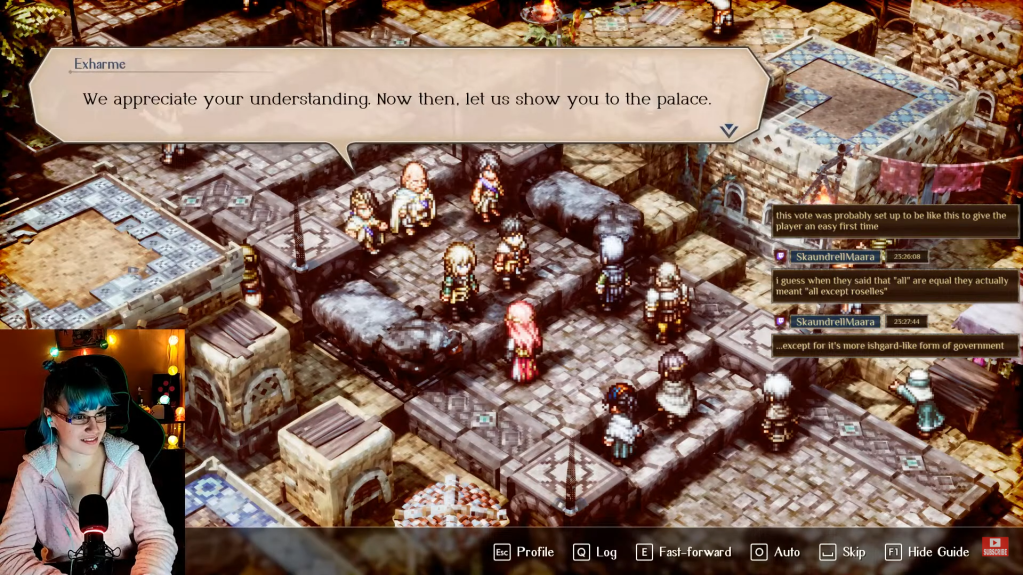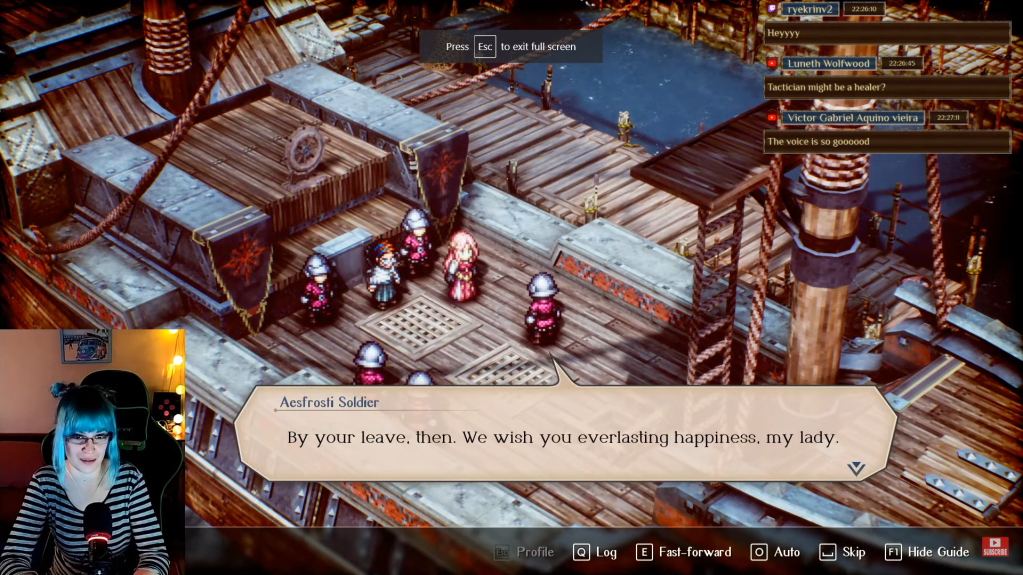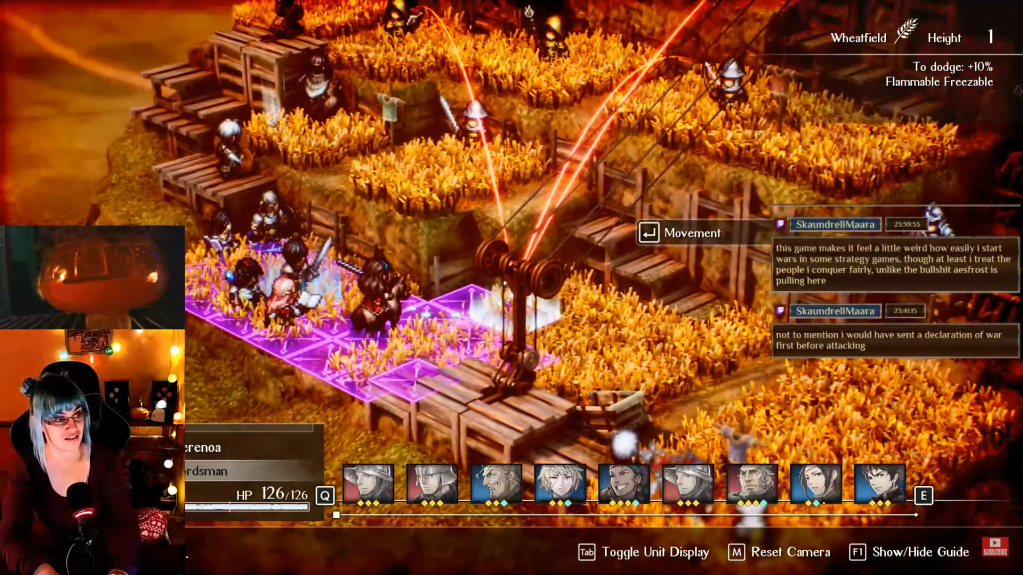After finishing the game and letting it settle in my mind for a couple of days, I’m ready to sit down and talk about Triangle Strategy, which has recently had its Steam release – without any spoilers, of course. At first, I was quite jealous of all the Switch owners (as I’m not one), even hoping that the game wasn’t as good as advertised – but I’m thrilled that I’ve been proven wrong, and that my jealousy was unfounded, as I got to play it on PC as well. Thanks ever so much to Square Enix for providing me with the copy of the game that was about 50 hours worth of fun and enjoyment, as I didn’t even feel the time passing by. No game is perfect, of course, and I’ll get to that as well, but Triangle Strategy has easily squeezed its way into my top 3 games of this year!
The good…
First, I want to talk about the things about Triangle Strategy that I enjoyed, so buckle up, ‘cause there’s plenty. One of the most important things about the game is its story, which I fell in love with from the very beginning. The plot has managed to keep me interested throughout the entire game, and I had a blast making story-altering decisions… Even when my team would decide that my decisions were terrible and overthrew them during voting. So far, I’ve only explored one ending, and as satisfying as it was, I want to know more about the story and I’ll definitely go back and check out the rest of them. To my great surprise, all of the side quests in the game are nothing but cool, little lore bits, and I did all of them, so if you’re considering just breezing through MSQ, trust me – they are well worth the time and feel like a crucial part of the story.

There’s no discussing the story without mentioning character progression, which in my opinion has been flawless. The characters are very well crafted, feel like actual people, and have their own imperfections that make the game feel so much more than a JRPG with a predictable plot and cliche tropes, as Triangle Strategy is anything but. I was very surprised with where some of the characters ended up in the story, and even the ending has left me some room to think about what would happen after. The only way you’re going to dislike this game is if you despise story-rich, almost graphic novel-like games with a lot of depth and storytelling, and if you’re reading this, I’m already assuming that’s not the case.
I don’t think it’s realistic to talk about Triangle Strategy without mentioning just how good of a soundtrack it has. It’s not just about the tunes – it’s also their placement in the game, and a very good understanding of when the game needs to go silent for dramatic effect. I enjoyed these transitions and they’ve helped me immerse myself so much more, so if this is something you appreciate about your games, I highly recommend giving Triangle Strategy a go.
The artstyle of this game might just be its greatest selling point at first glance, and if you’re a fan of HD-2D graphics, this game is most likely something that’s already pretty compelling. The colors, the contrast and the overall charming movement of the characters is all very cozy and charismatic, there are plenty of different zones and gorgeous-looking battlefields, as well as adorable little details like meowing cats and hilarious interactions with villagers. All in all, it is an absolute treat for the eyes, through and through, and this is coming from someone who’s up until recently been reluctant to play anything other than hyper-realistic games. That being said, I am sold, and now love pixels once more.

But I can only assume you don’t just want to know about the art and the story, as the most important aspect of the game is actually getting to play it – although I’m a huge defender of graphic novels in the gaming genre myself, being the cozy, after-kids-bedtime gamer that I am. In comparison to some other similar strategy titles that I’ve gotten to play lately, Triangle Strategy has a significant increase in complexity and demand for strategy in combat as the chapters go on. With weapon upgrades, choices of accessories, the possibility of character upgrades with limited resources, change of terrain, addition of new types of enemies, and overall longer battles, I felt like the game was getting progressively more complicated and fun. Even losing some battles didn’t feel as bad, as the game doesn’t kick you while you’re down – instead, you get to keep your hard-earned kudos and the experience. This is very rewarding, and you shouldn’t feel bad, as these battles are how you level the characters, so from time to time you might feel like you need to do a mock battle or two just to unlock an OP ability or be less squishy. Or, you know, just hit harder. Which always feels good.
For some people, voice acting can make it or break it, and if you’re one of them, I can almost assure you this game is going to make it. The variety of voices and the skill to knit their emotions into the text line is fully on point – I felt like there was an actual conflict unraveling before my eyes thanks to these wonderful, talented people. There’s not a single character I felt was lacking when it comes to voice acting, and some managed to surprise me with just how unique the color of their voice was.

The not-so-good…
There’s not a lot that I dislike about the game itself, but what felt kind of bad throughout my playthrough was the inability to play with some of the characters if I happen to have a single battle without them in my roster. Some of the characters I unlocked felt really fun, but I never got to play them closer to the endgame, as they were forever stuck at level 5 or 10. I simply wasn’t invested enough into losing battles just so that they could see the battlefield and be ready to hop into my main team, as I didn’t even know if I’d want them there. I wished there was some way of them passively gaining at least some amount of experience, similarly to how they do in FF7 Original, so that there’s at least hope of using them when they’re recommended in later battles, and they happened to skip a few of them. Over time, at least during the first playthrough, it becomes clear that the variety in the main roster should be kept to a minimum, as getting enough levels to beat the battles can sometimes feel like a tight squeeze – at least on Normal, and I would imagine Hard mode as well.
That’s all I have to say for now when it comes to Triangle Strategy. What are your thoughts on the game? Let me know in the comments, and if you’re into RPGs of any kind, make sure to subscribe to my variety YouTube channel so you don’t miss out. If you’d like to check out the game, here’s where you can find it on Steam!





Leave a comment